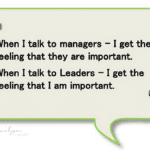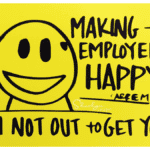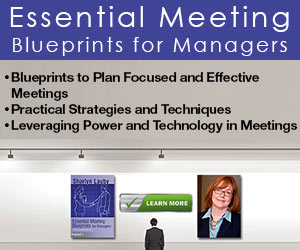Talk about awkward situations. That’s the challenge from this reader:
I’d love to hear your opinion on this situation. An employee called in sick for their shift. Later that day, the manager was out with her daughter for a nice meal and saw the employee out with a friend at the same restaurant. It was certain the ‘sick’ employee saw the manager as well. The Manager did not confront the employee in the restaurant.
What you recommend the manager do in this situation? Or employee?
First, for the employee who called in sick: While no one wishes you’re sick, hopefully you’re not lying about it. If you did lie about being sick so you could go out with a friend, then you really should come clean with the manager who saw you. And if you really did legitimately call in sick, you shouldn’t be in a restaurant spreading your germs around. This is “Calling in Sick 101”.
On some level, it doesn’t really matter who saw the employee at the restaurant. I’m sure there are plenty of people besides the manager who knew the employee called in sick. The issue becomes trust. I believe that co-workers are willing to pitch in and take on extra work when an employee calls in sick because they trust the employee.
- They trust the employee is really sick.
- They trust that the employee is being considerate by not coming in and spreading their germs all over the office.
- And they trust the employee would do the same for them.
At the point the employee is seen out at a restaurant, trust becomes a factor. Now if the manager says, I still trust the employee no questions asked…then I guess it doesn’t matter if the manager confronts the employee or not.
If the manager says that trust is an issue, then they need to have a conversation with the employee. I don’t know that this situation needs to become a disciplinary issue. That depends on your company policies and what the employee says. But the manager can simply raise the question – “You know, we saw each other at The Monkey Bar Steakhouse on Thursday night. I was a little surprised since you had called in sick earlier that day. I think we should discuss it.”
There could be a story here that makes complete sense. Or maybe not. If you have the discussion, then you’re in a position to figure it out. There’s absolutely nothing wrong with asking a question and keeping an open mind.
Image courtesy of HR Bartender








Scarlet_3 says
This is silly. Personally, I don’t think there should be designated codes for paid time off and I don’t think employees should have to give a “reason”. An employee should just be able to call in and take a day off if they have it to use (assuming they’re not using a week’s worth of time/being generally respectful about it). It’s part of their compensation package and I don’t really care if they use it for the flu or if they needed a mental health day. Either way, they’ve had a day to regroup and come back refreshed. Calling them out after the fact based on your lack of trust shows an insecurity on the part of the manager. If you can honestly say you don’t trust someone because they called off for one day, you have bigger issues as a leader.
Guy says
I agree with Scarlet_3; In my opinion, this article would be relevant back in the 80’s and beyond. In today’s workplace environment, ‘a lot’ of organizations combine your sick days with personal / vacation days. Please not I generalized ‘a lot’ of organizations. The one thing I can see is if the employee is based on exempt or non-exempt status. In other words, hourly vs salary. Then, this would article would make sense as it would directly apply to the hourly waged employee as they probably have their vacation days separate to their sick days.
Sharlyn Lauby says
Thanks for the comments. I agree that many companies combine time off. And I agree employees should be able to call their supervisors and say they need a “beach day”. The reader wasn’t questioning their company’s sick day policy so I didn’t interpret that as the point of the story.
My take on the reader’s question was the employee said they were sick and they didn’t appear to be sick. Now what? I’ve had employees call me to say they need to attend the funeral of a dear family member and later find out they went to the beach. If an employee wanted to go to the beach, just say so. As you indicated, we’re all adults here so there’s no need to make up a story.
I can’t tell for sure from the reader’s question, but I wonder if the employee feels they can’t tell their manager truly serious stuff. If they can’t say they want a mental health day, is the employee ready to admit making a mistake or hold a co-worker accountable? It seems like the calling-in sick incident is only a symptom.
Scarlet_3 says
I understand what you’re saying but in my opinion they’re two seperate situations: lack of trust and PTO. I don’t think it’s ever okay for an employer to feel this paternalistic sense of control whereby they feel justified to punish an employee for taking a day off and not being forthcoming about the reason. If that’s the case, it’s a small wonder there’s a lack of trust. The employer should be less worried about calling out this employee on his fib and more worried about why his/her employees don’t trust him/her.
Sharlyn Lauby says
Hi Scarlet. Thanks for the comment. I see your point and hopefully you can see mine.
My goal for the post was to address the reader’s question – not point out the merits or faults of one policy or another. Again, the reader didn’t say anything about disciplining an employee over calling in sick.
Regardless of our opinions, most companies have business needs that guide their decision making when it comes to time off. Just look at what’s happening at Yahoo and Best Buy.
Helen says
I think that when most of us have had to call out sick we feel inclined to say why whether we are ourselves are sick or if a child is sick. I don’t condone the person calling out sick and going out however she might have been sick, felt better and decided to go out in the evening. I like the idea of PTO time, this way you can take the time off and don’t have to spend time explaining why. Its hard because things come up and calling out sick seems to be the only thing you can use where you don’t have to get approval in advance. I have had bosses who have told me that it is good from time to time to take a mental health day. Every now and then we all need a break. I prefer to just call out and not explain this way I am not lying. Giving and explanation is justifying your reasoning and you are more likely to lie.
Allen says
Wow u must all work in a unionized environment! I’m sorry but unless your unionized and have a specific number of sick days allocated then the above situation is for sure a disciplinary issue. Companies pay salaried workers for sick days because they believe they are sick and do not want to punish someone for a legitimate sick day. As far as these comments about “mental days” or “beach days” those are called vacation days people!
If your entitled to say 3 weeks vacation u don’t get to take extra days off with pay just cause you need one and saying your sick when your not to get those extra paid days off is a serious breach in most company codes of ethics and trust. In fact it’s equal to time theft for those of you working on a punch clock.
Tyson E. Dewsnup says
One Company I Used To Work For Separated Sick Time From vacation Time. Aside From That Though, I Don’t Like It When My Employees Call In When They Really Aren’t Sick. While PTO can Be Used As The Employee Sees Fit, It’s Not Fair To The Company, Supervisor, Or Co-Workers If Someone Decides That Morning That They Need A “Beach Day.” The Way I See It, Professionals Schedule And Get Their Vacation Time Approved Ahead Of Time.
(Please Forgive The Capital On Every Word. For Some Reason, My Phone Did That).
Tyson E. Dewsnup says
the Exception, Of Course, Would Be If An Emergency Or Something Came Up.
Shane says
I had hoped that the article would have a little more meat; the title and summary really drew mw. I work in a unionized environment where sick and vacation days are separated and specific and abuse of sick leave is well known and rampant, even by one or two of the managers. The trust issue comes in when we hear about, for instance, a site manager in a remote location disappears often and calls in sick but even his staff report seeing him bowling, etc. I’d hoped the article would have specific strategies.
Greg says
Commenters are right that there is a trend toward rolling all days off into PTO. But it is a horrible trend! It creates an incentive where employees never take sick days because they don’t want to “waste” a vacation day. Instead, they drag themselves in when they truly are sick and spread their germs everywhere. (Personally, I think companies should just not track time off at all, but that’s a larger issue.)
It is a much better policy to tell employees “If you’re sick, don’t come in. Rest up and get better.” Which is why employees like the one discussed in this blog post are so pernicious. Yes, employers should treat employees like adults and trust them. But this employee was demonstrating that they can’t be trusted! This type of behavior is why employers feel the need to pile on more and more rules regulating their employees. I’m reminded of that old SNL skit about “Ruining It for Everyone” (http://snltranscripts.jt.org/93/93druining.phtml)
Cathy says
In the name of brevity there’s a lot left out of the original scenario so we each have to make assumptions about the situation.
When the manager and employee have a good, trusting relationship – and the employee is generally responsible – there’s probably no need to talk about it. Some managers I’ve worked with suggest ‘mental health’ days when they know someone’s been working really hard and the manager doesn’t want the person to have to use up a vacation day.
On the other hand, when a manager doesn’t trust an employee it’s easy to make the worst assumptions and be sure they are the facts.
I’ve been an HR manager and leader for a long time. The 2 questions for me are will the manager be aware of why he or she is assuming the employee lied or didn’t lie and how will the manager handle similar situations with other employees.
John Falcetta says
Absent the PTO discussion which wasnt the question, I would fire the employee. If the employee is willing to lie about being sick and gets away with it, they are probably willing to lie about more important work related matters. It will sooner or later get out that they were fired for lying about it and other employees will think twice. I am sure most HR people will disagree, but they are probably the same ones who complain that they dont have a seat at the big table. No time for slackers.
Gwen Nugent says
I have a concern that is basically the opposite of this scenario. I have exempt employees who will email in the morning that they are taking a sick day, but in the same email say they are working from home and available. I’ve not found any legal reason why an exempt employee, with available paid sick leave (we do have a bone fide leave plan) can’t do work from home while taking a paid sick day, we’d like to have a “policy” encouraging them to refrain from working at home if they are indeed ill. This scenario is essentially ‘telecommuting’ which is only available sporadically, on a case-by-case basis, with pre-approval from the CEO. Your thoughts?
Rags says
As many had mentioned and I agree that the scenario discussed does not have specifics. However, there were several heartfelt comments and they have their own merits. If such a scenario causes a concern from a HR or management perspective, then it is time the organization starts evaluating their policies. There is no perfect company or perfect policy. Smart companies change their policies to adapt with time.
If the incident discussed is an isolated one and the company has a low-tolerance on violation of sick leave policy, then I agree with Sharlyn Lauby’s suggestions. Providing the benefit of the doubt to the employee by the manager builds trust and perhaps help the employee get back on an honest track. However, if the incident discussed is widely prevalent then the company has to seriously look into their policy(ies) and change them to prevent this becoming a distraction for the company’s ability to compete effectively in the market.
Cedric,D,Mendes says
i recently took a sick leave because i had some pain in my ear but then later on in the day i felt better and didnt feel any pain so went out with my friends to the pub in the evening ….the next day i return to work i had disciplinary actions taken against me for going to the pub